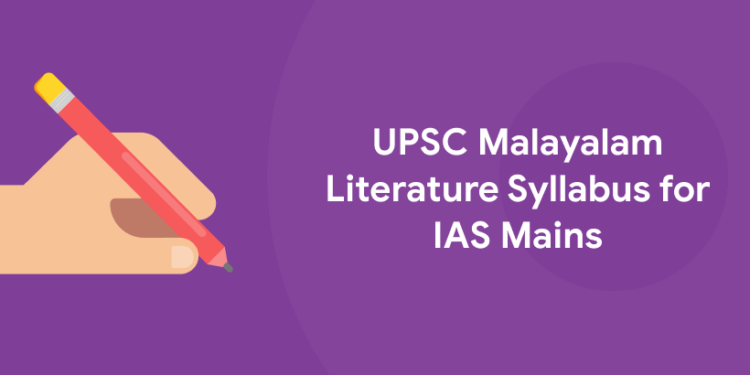Table of Contents
The UPSC Civil Services Examination is divided into three stages: preliminary, mains, and interview. For the UPSC IAS mains exam, candidates must select one optional topic. It is very important in determining an aspirant’s ranking in the IAS Examination. Current statistics indicate that the success rate of Literature disciplines is increasing with time. Malayalam belongs to the Dravidian language family. It is popular in Kerala, Tamil Nadu, and Karnataka. It’s also used in the Lakshadweep islands and Mahe, which is part of the Union Territory of Pondicherry. UPSC Malayalam literature is one of the UPSC Mains exam’s optional subject list. Before going through the syllabus, IAS aspirants should learn about the benefits of Malayalam literature as an optional subject in the attached article.
Who should opt for Malayalam in IAS (UPSC CSE) Mains?
Malayalam is a language spoken in India, predominantly in the state of Kerala. Candidates who have studied the Malayalam literature can opt for it as an optional subject in the IAS (UPSC CSE) Mains Exam. Some of the factors that one must account for before choosing Malayalam as an optional subject are:
Advantages of choosing Malayalam
- Well defined syllabus and Less subjectivity
- Direct and straightforward questions
- Ample scope to score marks with diagrams
- The inquiries in this subject are immediate and crucial.
- Room for interpretation in the written answers
- Quality of answers as there is no limitation to different kinds of answers.
- Updation in the syllabus is rare
Disadvantages of choosing Malayalam
- Subjective Nature of the answers can lead to less scoring at times if your views do not match with the evaluator.
- Lack of resources
- No syllabus overlaps with GS papers
- Essay writing and interviews won’t pose much of a problem as the amount of reading will help with these.
UPSC Malayalam Mains Syllabus – Download PDF
Click below link to download UPSC Malayalam mains syllabus PDF
UPSC Malayalam Mains Syllabus
UPSC Mains Malayalam Syllabus PAPER – I (Answers must be written in Malayalam)
Section-A
Unit 1-Early phase of Malayalam Language:
1.1 Various theories: origin from proto Dravidian, Tamil, Sanskrit.
1.2 Relation between Tamil and Malayalam: Six nayas of A.R.
Rajarajavarma.
1.3 Pattu school-definition, Ramacharitam, later pattu works-Niranam
works and Krishnagatha.
Unit 2-Linguistic features of :
2.1 Manipravalam-definition. Language of early manipravala works- Champu, Sandesakavya, Chandrotsava, minor works. Later Manipravala works-medieval Champu and Attakkatha.
2.2 Folklore-Southern and Northern ballads, Mappila songs.
2.3 Early Malayalam prose- B h a s h a k a u t a l i y a m , Brahmandapuranam, Attaprakaram, Kramadipika and Nambiantamil.
Unit 3-Standardisation of Malayalam:
3.1 Peculairities of the language of Pana, Kilippattu and Tullal.
3.2 Contributions of indigenous and European missionaries to Malayalam.
3.3 Characteristics of contemporary Malayalam : Malayalam as administravie language. Language of scientific and technical literature-media language.
Section-B
Literary History
Unit-4 Ancient and Medieval Literature:
4.1 Pattu-Ramacharitam, Niranam works and Krishnagatha.
4.2 Manipravalam-early and medieval manipravala works including attakkatha and champu.
4.3 Folk literature.
4.4 Kilippattu, Tullal and Mahakavya.
Unit 5- Modern Literature-Poerty:
5.1 Venmani poets and contemporaries.
5.2 The advent of Romanticism-Poerty of Kavitraya i.e., Asan, Ulloor and Vallathol
5.3 Poetry after Kavitraya.
5.4 Modernism in Malayalam poetry.
Unit 6- Modern Literature-Prose:
6.1 Drama
6.2 Novel
6.3 Short story
6.4 Biography, travelogue, essay and criticism.
UPSC Mains Malayalam Syllabus PAPER – II (Answers must be written in Malayalam)
This paper will require first-hand reading of the texts prescribed and is designed to test the candidate’s critical ability.
Section-A
Unit 1
1.1 Ramacharitam-Patalam 1.
1.2 Kannassaramayanam-Balakandam first 25 stanzas.
1.3 Unnunilisandesam-Purvabhagam 25 slokas including Prastavana
1.4 Mahabharatham Kilippattu- Bhishmaparvam.
Unit 2
2.1 Kumaran Asan-Chintavisthayaya Sita.
2.2 Vailoppilli-Kutiyozhikkal.
2.3 G. Sankara Kurup-Perunthachan.
2.4 N.V. Krishna Variar-Tivandiyile Pattu.
Unit 3
3.1 ONV -Bhumikkoru Charamagitam
3.2 Ayyappa Panicker-Kurukshetram.
3.3 Akkittam-Pandatha Messanthi
3.4 Attur Ravivarma-Megharupan.
Section-B
Unit 4
4.1 O. Chanthu Menon-Indulekha
4.2 Thakazhy-Chemmin.
4.3 O V Vijayan-Khasakkinte Ithihasam.
Unit 5
5.1 MT Vasudevan Nair-Vanaprastham (Collection).
5.2 N S Madhavan-Higvitta (Collection).
5.3 C J. Thomas-1128-il Crime 27.
Unit 6
6.1 Kuttikrishna Marar-Bharataparyatanam
6.2 M. K Sanu-Nakshatrangalute snehabhajanam
6.3 V.T. Bhattathirippad-Kannirum Kinavum.
Interview Test
- The candidate will be interviewed by a Board who will have before them a record of his career. He will be asked questions on matters of general interest. The object of the interview is to assess the personal suitability of the candidate for a career in public service by a Board of competent and unbiased observers. The test is intended to judge the mental caliber of a candidate. In broad terms this is really an assessment of not only his intellectual qualities but also social traits and his interest in current affairs. Some of the qualities to be judged are mental alertness, critical powers of assimilation, clear and logical exposition, balance of judgement, variety and depth of interest, ability for social cohesion and leadership, intellectual and moral integrity.
- The technique of the interview is not that of a strict cross-examination but of a natural, though directed and purposive conversation which is intended to reveal the mental qualities of the candidate.
- The interview test is not intended to be a test either of the specialised or general knowledge of the candidates which has been already tested through their written papers. Candidates are expected to have taken an intelligent interest not only in their special subjects of academic study but also in the events which are happening around them both within and outside their own State or Country as well as in modern currents of thought and in new discoveries which should rouse the curiosity of well educated youth.
UPSC Malayalam Literature Exam Pattern
UPSC Malayalam Literature Exam Pattern is very essential to understand as it will give the candidates an idea about how the actual examination is going to be. Moreover, the UPSC Malayalam Syllabus topics are provided section-wise by the UPSC in the official syllabus. Take a look at the UPSC IAS Exam Pattern for Malayalam Literature:
- There will be two papers for Malayalam Literature or other Optional Subjects in UPSC Mains Examination.
- Both the papers of the Malayalam Literature Optional Subject will be 250 marks each, which totals up to 500 marks.
- All papers including both the Malayalam Literature Optional Subject Papers are subjective.
- There is no negative marking.
- Both the Malayalam Literature Optional Subject Papers are to be written in Malayalam only.
| Sr. No. | Paper | Subject | Marks |
| 1. | Paper VI | Optional Subject Paper-I | 250 |
| 2. | Paper VII | Optional Subject Paper-II | 250 |
| TOTAL | 500 | ||
| Time Duration | 3 hours | ||
How to Prepare for UPSC Malayalam Literature Optional Paper?
Malayalam Literature is considered to be one of the most scoring subjects out of all Optional Subjects because of its relatively small syllabus as well as its specificity of the language which prevents a great amount of competition. The poems and prose must have been completed during the school years if the candidates had the Malayalam Language in the course.
With this, let us discuss some pointers about preparation tips so that you can feature in the UPSC Civil Services Exam Merit List. It will hopefully help the candidates to organise and plan their preparation for UPSC Malayalam Literature Syllabus well. The tips that may help candidates while preparing for the exam are:
- Candidates cannot avoid at least one reading of the prescribed texts in the syllabus. UPSC is looking for unique and personal interpretations, criticisms and analyses of the gives texts rather than popular ones.
- Take help from reference books and other critics to form your opinions as well as get to know alternative views about the texts.
- Try to find contemporary significance and references of the prescribed texts.
- Place them in the literary movements and socio-political contexts of the times they were written in.
- Also wherever relevant, try to identify the author’s social location, life, experiences and motivations that might reflect through their literary works.
- Plan your study in a long-term calendar and keep track of the completed and remaining topics with the help of the UPSC Malayalam Literature Syllabus Pdf provided in the link above.
- Practice answer writing to write your thoughts down in a concise and precise manner.
- Check out the previous year papers and solve them.
Best Books For Malayalam Literature Syllabus
We understand the importance of using good study material and reliable books for optimal preparation of Malayalam Literature Optional Subject in the UPSC IAS Exam. Take a look at them below:
| Subject | Name of Book | Author or Publisher |
| MALAYALAM LITERATURE | Kairaliyude Kadha | M. Krishna Pillai |
| Malayala Sahithya Charithram | Kalaghattangalilude – Erumeli | |
| Civil Service exam Malayalam Optional paper I | Jobin S Kottaram | |
| Civil Service exam Malayalam Optional paper II | Jobin S Kottaram, Renu Raj, Aswathy |












